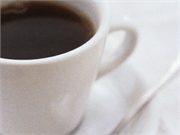- Could Your Grocery Store Meat Be Causing Recurring UTIs?
- Are You Making This Expensive Thermostat Error This Winter?
- Recognizing the Signs of Hypothyroidism
- 10 Strategies to Overcome Insomnia
- Could Artificial Sweeteners Be Aging the Brain Faster?
- Techniques for Soothing Your Nervous System
- Does the Water in Your House Smell Funny? Here’s Why
- Can a Daily Dose of Apple Cider Vinegar Actually Aid Weight Loss?
- 6 Health Beverages That Can Actually Spike Your Blood Sugar
- Treatment Options for Social Anxiety Disorder
Coffee: Good for You or Not?

Coffee has been tied to many potential health benefits, but people should drink it for pleasure, and not disease prevention.
That’s one of the main conclusions of a new research review. In it, researchers give an overview of the evidence on coffee and caffeine — the subjects of many health studies over the years.
“The impact of coffee consumption on health is important because there are few other dietary factors that so many people across the world are so frequently exposed to,” said Rob van Dam, the lead author on the review.
And overall, his team found, the news is good for coffee lovers: Caffeinated coffee does not appear to raise any disease risks, and is instead linked to lower odds of various diseases. And moderate doses of caffeine are generally safe for most people.
“Moderate” is the key, however. Too much caffeine can disrupt sleep or make people jittery.
“The amount of caffeine that leads to unpleasant side effects varies greatly from person to person,” said van Dam, a professor at the National University of Singapore.
He suggested people pay attention to whether caffeine seems to affect their ability to fall asleep or lead to “agitation or anxiety.” If it does, van Dam said, “they can adapt their level of intake or timing of intake during the day.”
That’s the advice for most adults. Pregnant women, however, should be particularly careful about caffeine intake. Based on the evidence, van Dam’s team said, they should limit themselves to no more than 200 milligrams of caffeine a day.
That’s roughly the amount in 12 ounces of coffee.
For nonpregnant people, van Dam said that up to five 8-ounce cups of coffee a day may be fine, depending on a person’s caffeine tolerance.
Lauri Wright is chair of nutrition and dietetics at the University of North Florida, and a spokesperson for the Academy of Nutrition and Dietetics.
“There’s been so much back-and-forth over the years about whether caffeine is good or bad,” said Wright, who was not involved in the review. “So it’s good to come back to the evidence.”
In general, studies show that despite caffeine’s bad reputation as a stimulant, caffeinated coffee does not seem to raise the risk of developing high blood pressure — or worsen existing blood pressure problems.
In fact, coffee consumption has been linked to lower risks of developing heart disease, as well as other serious conditions. The list includes type 2 diabetes, certain cancers, Parkinson’s disease, liver disease and gallstones, according to the review.
None of those studies, however, prove that coffee — or caffeine — are responsible for the lower risks, Wright said. She agreed with the report’s conclusion that people should not rely on java to prevent any diseases.
“But coffee and caffeine can be part of a healthy lifestyle,” Wright said.
There is a question over whether filtered coffee (from a drip coffee maker, for instance) is healthier than unfiltered. The latter includes espresso, boiled coffee and coffee made by French press, for example.
According to van Dam, research shows that unfiltered coffee can raise blood cholesterol levels.
Wright, however, said “what you put into the coffee is what really matters, rather than whether it’s filtered or unfiltered.” That is, avoid loading that coffee cup with sugar and cream.
“Some of these coffee drinks people buy are more like milk shakes,” Wright said.
There are other sources of dietary caffeine, including tea, sodas and chocolate. For the most part, though, they contain low amounts, Wright said.
Two exceptions, she noted, are energy drinks and “shots,” which can contain as much or more caffeine than a cup of coffee. High intake of those beverages can cause spikes in blood pressure and heart palpitations, according to the review.
Caffeine can also interact with certain medications. If people have questions about their medications, Wright said, they can talk to their pharmacist.
The review was published July 23 in the New England Journal of Medicine.
More information
The Harvard School of Public Health has more on coffee and health.
Source: HealthDay
Copyright © 2026 HealthDay. All rights reserved.










